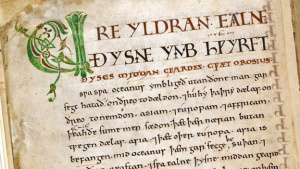Language/Old-english-ca-450-1100/Vocabulary/Animals
Hi Old English (ca. 450-1100) learners! 😊
In this lesson, we will focus on animals vocabulary in Old English (ca. 450-1100). 🦁🐻🐘🦏🦜🐢🦑🦔🦒
Don't hesitate to look into these other pages after completing this lesson: Education, Say Hello and Greetings in Old English (ca. 450-1100), Drinks & How to say Good Bye?.
Basic Vocabulary[edit | edit source]
Here are some of the most common animals in Old English (ca. 450-1100):
| Old English (ca. 450-1100) | Pronunciation | English |
|---|---|---|
| Hors | /hors/ | Horse |
| Cū | /ku/ | Cow |
| Hrān | /hrɑːn/ | Raven |
| Swīn | /swiːn/ | Pig |
| Grȳre | /ɡryːre/ | Gryphon |
| Wulf | /wulf/ | Wolf |
| Bera | /berɑː/ | Bear |
| Scēap | /ʃæːɑp/ | Sheep |
| Ilfetu | /ilvetu/ | Elephant |
Here is a dialogue:
- Person 1: Hors. (/hors/) (Horse.)
- Person 2: Hors eart þū. (/hors æɑrt θuː/) (You are a horse.)
- Person 1: Suēg eom ic. (/suːeɡ eom ik/) (I am a pig.)
- Person 2: Nē Suēg nytenu sind god to ēotum. (/neː suːeɡ nyteny sind ɡod to eo̯tum/) (No, pigs are not good animals for giants.)
- Person 1: Grȳran sind fæmne beornas. (/ɡryːrɑn sind fæmne beornɑs/) (Gryphons are brave heroes.)
- Person 2: Suēn and cūen in þǣm feldum sind. (/suæn ɑnd kuæn in θæːm feldum sind/) (Pigs and cows are in the fields.)
Advanced Vocabulary[edit | edit source]
Here are some more animals in Old English (ca. 450-1100):
| Old English (ca. 450-1100) | Pronunciation | English |
|---|---|---|
| Flēoganfisc | /fleːoɣɑnfish/ | Flying fish |
| Ūle | /uːle/ | Owl |
| Eorðdraca | /eorðdrɑkɑ/ | Ground dragon (Snake) |
| Orrere | /orere/ | Spider |
| Seolh | /seolx/ | Seal |
| Skreppa | /skreppɑː/ | Crab |
| Draca | /drɑkɑ/ | Dragon |
| Ēower | /eːower/ | Beaver |
| Hond | /hond/ | Dog |
Here is a dialogue:
- Person 1: Hwæt is ūlene on Englisc? (/ʍæt is uːlene on eŋɣliʃ?/) (What is owl in English?)
- Person 2: Ūle. (/uːle/) (Owl.)
- Person 1: Orrere is þæs hūses inne. (/orere is θæs huːses inːe/) (Spider is inside the house.)
- Person 2: Hwæt sīeð ēower? (/ʍæt siːeð eːower/) (What does beaver eat?)
- Person 1: Ēower eteð twīge ācera wīstfullan. (/eːower eteθ twiːɣe ɑːcera wiːstfullɑn/) (Beaver eats the bark of trees.)
- Person 2: Seolhfisces libbað on þǣm ea. (/seolxfishes libbɑð on θæːm æɑ/) (Seals live in the river.)
- Person 1: Skryppan crawlath on þǣm sande. (/skreppɑn crɑwleθ on θæːm sɑnde/) (Crabs crawl on the sand.)
Fun Facts[edit | edit source]
- Did you know that the Anglo-Saxon word for "eagle" (Earn) inspired the name of the legendary hero Beowulf ("bee-wolf" = bear)? Beowulf was a Geatish hero who fought against the monster Grendel and his mother.
- In Old English (ca. 450-1100) literature, there is a famous riddle about a creature that walks on four legs in the morning, two legs in the afternoon, and three legs in the evening. The answer is a human being: crawling as a baby, walking upright as an adult, and using a cane in old age.
- The word "werewolf" (from Old English wer + wulf) originally meant "man-wolf," not a half-human, half-wolf hybrid like in modern fiction.
To improve your Old English (ca. 450-1100) Vocabulary, you can also use the Polyglot Club website. Find native speakers and ask them any questions!
➡ If you have any questions, please ask them in the comments section below.
➡ Feel free to edit this wiki page if you think it can be improved. 😎
Other Lessons[edit | edit source]
- Days of the Week
- How to Say Hello and Greetings
- Fruits
- Colors
- Drinks
- Count to 10
- Health
- Express Surprise
- Clothes

